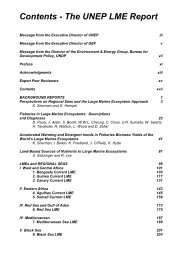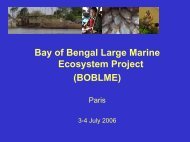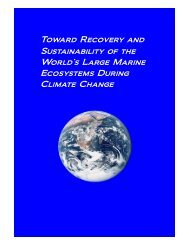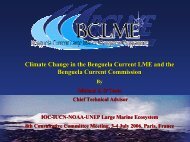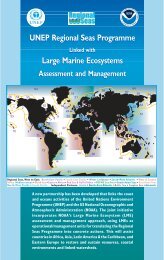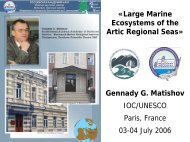Sustaining the World's Large Marine Ecosystems
Sustaining the World's Large Marine Ecosystems
Sustaining the World's Large Marine Ecosystems
You also want an ePaper? Increase the reach of your titles
YUMPU automatically turns print PDFs into web optimized ePapers that Google loves.
those goals in mind, BCLME became a strong driver for <strong>the</strong> establishment of a<br />
Pan-African LME Alliance (see below).<br />
Human capacity<br />
Within any LME, sustainable management of fisheries and o<strong>the</strong>r kinds of uses of<br />
<strong>the</strong> goods and services of <strong>the</strong> sea, including biodiversity, requires a sound<br />
scientific basis in natural and social and economic sciences, strong assessment<br />
methods, indicators comparable across LMEs, effective monitoring routines and<br />
good governance based on full stakeholder participation.<br />
In each LME project good science is needed, often to be done by many more<br />
marine scientists and social and economic experts very competent in <strong>the</strong>ir own<br />
field but also willing to enter fruitful discussions with experts in o<strong>the</strong>r fields in<br />
order to develop overarching concepts and solutions. In Africa alone several<br />
thousand professionals of different levels of training and experience are now<br />
engaged in <strong>the</strong> LME projects. They have been trained by <strong>the</strong> concerted efforts of<br />
<strong>the</strong> countries of <strong>the</strong> region with substantial and continued outside support. The<br />
greatest need for fur<strong>the</strong>r capacity building is in countries bordering <strong>the</strong> tropical<br />
and subtropical parts of <strong>the</strong> world’s oceans. Here <strong>the</strong> need for food security is<br />
most pressing and <strong>the</strong> loss of biodiversity is greatest.<br />
Enhancement of scientific and technical capacity means primarily investing in<br />
people and institutions. The BCLME Programme and o<strong>the</strong>r LME projects have<br />
done much in terms of augmenting <strong>the</strong> scientific, technical and administrative<br />
capacity for marine activities in many countries. Human capacity was created by<br />
overseas fellowships, training courses in <strong>the</strong> region and particularly by training on<br />
<strong>the</strong> job. Any programme for advanced capacity building should be based on close<br />
relations to <strong>the</strong> universities of <strong>the</strong> region.<br />
Much of <strong>the</strong> capacity built over <strong>the</strong> years was quickly lost through brain drain.<br />
The LME projects toge<strong>the</strong>r with <strong>the</strong> local research institutes and universities lost<br />
many of <strong>the</strong>ir best people moving into more lucrative jobs within <strong>the</strong> region or<br />
overseas. Therefore, any new capacity enhancement programme has to include<br />
measures for combating <strong>the</strong> brain drain. This is mostly a matter of governmental<br />
policies providing adequate incentives in terms of higher salaries, career<br />
assurance and better working conditions particularly for women, who constitute a<br />
major or even <strong>the</strong> major part of <strong>the</strong> scientific and technical staff in marine science<br />
in developing countries.<br />
The need for a new generation of experts<br />
The complexity of <strong>the</strong> ecosystem approach to fisheries and o<strong>the</strong>r marine<br />
activities calls for a new generation of professionals, addressing <strong>the</strong> sustainability<br />
113



